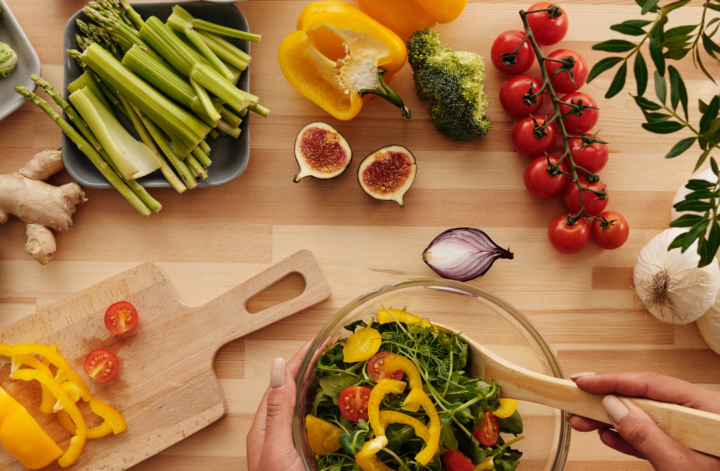Cooking with fresh ingredients offers numerous advantages that enhance both flavor and nutrition. Fresh food contains higher levels of vitamins and minerals, providing a significant boost to overall health. By using seasonal produce, individuals can also improve their culinary skills while enjoying meals that are not only delicious but also visually appealing.
Incorporating fresh ingredients into meals contributes to a more balanced diet, which can lead to better energy levels and improved mental clarity. The act of cooking with fresh food can revive a sense of creativity in the kitchen, encouraging experimentation with new recipes and flavors. This engagement with food often fosters a deeper appreciation for what is consumed.
Moreover, fresh ingredients are typically free from preservatives and artificial additives, making them a healthier option. Choosing to cook with fresh produce supports local farmers and sustainable practices, which can positively impact the community and the environment. Companies like New Forest Fruit Co and similar others, play an important role in this movement by growing high-quality soft fruits using environmentally responsible farming methods and supplying fresh produce to retailers and local markets. Embracing fresh cooking can transform not just meals, but overall lifestyle.
Health and Nutrition Advantages of Fresh Ingredients
Fresh ingredients offer significant health and nutrition benefits. They provide essential vitamins and minerals, reduce harmful additives, and support overall well-being.
Maximizing Nutritional Value
Fresh fruits and vegetables are rich in vitamins and minerals that are vital for health. Nutrient content tends to decline in processed foods due to cooking, storage, and transportation. For instance, vitamins such as C and B complex are most abundant in fresh produce.
Key Nutrients in Fresh Ingredients:
- Vitamin C: Important for immune function.
- Fiber: Aids digestion and helps maintain cholesterol levels.
- Antioxidants: Found in many fresh fruits, they combat oxidative stress.
Choosing seasonal and local produce can further enhance nutrient intake. Eating fresh ensures that individuals consume the highest quality ingredients with maximum health benefits.
Reducing Exposure to Additives and Preservatives
Cooking with fresh ingredients minimizes the intake of harmful additives and preservatives commonly found in processed foods. Many packaged products contain sodium, chemicals, and artificial flavors that may negatively impact health.
Common Additives to Avoid:
- High Fructose Corn Syrup: Linked to obesity.
- Sodium Nitrite: Associated with health risks in processed meats.
By opting for fresh foods, individuals can significantly reduce their exposure to these substances and improve their health outcomes, ultimately supporting better dietary habits.
Supporting the Immune System and Reducing Inflammation
Fresh ingredients play a crucial role in supporting the immune system. Anti-inflammatory properties found in various fruits and vegetables help combat chronic inflammation, which is linked to numerous diseases.
Foods to Enhance Immunity:
- Citrus Fruits: Rich in vitamin C, boosting immune function.
- Leafy Greens: Contain vitamins, minerals, and antioxidants.
Additionally, fresh ingredients help maintain balanced cholesterol levels and support overall body function. A diet rich in fresh produce encourages better health by fostering a robust immune response and lowering inflammation.
Culinary Enhancement Through Freshness
Cooking with fresh ingredients significantly elevates the culinary experience. Fresh herbs and produce not only enhance flavors but also contribute to the nutritional value of dishes. The following subsections explore specific ways in which freshness transforms cooking.
Elevating Flavor with Herbs and Spices
Fresh herbs like oregano, sage, and mint offer vibrant flavors that dried variants simply cannot match. When using fresh herbs, the essential oils retain their potency, imparting a distinct aromatic quality. For instance, adding chopped mint to a salad can provide a refreshing twist.
Incorporating fresh garlic can vastly enhance savory dishes. Crushing or mincing fresh garlic releases more oils, resulting in a robust flavor profile. When combined with olive oil, it creates a rich base for sauces or dressings.
The incorporation of fresh herbs can be the key to transforming a simple dish into something extraordinary. A sprinkle of chopped sage over roasted mushrooms elevates the umami flavor, creating a harmonious blend.
The Role of Fresh Produce in Classic and Modern Recipes
Fresh produce is integral to both traditional and contemporary recipes. Ingredients like ripe tomatoes, crisp cucumbers, and tender greens not only enhance the aesthetic of a dish but also contribute essential nutrients.
In classic Italian cuisine, fresh basil features prominently in sauces and pastas. This ingredient enhances the overall flavor, making dishes more authentic. Modern recipes often highlight seasonal produce, which showcases the best of what is available.
Using fresh produce allows for greater versatility in meal preparation. From vibrant salads to hearty stews, the freshness of ingredients contributes to a delightful balance of flavors, encouraging creativity in cooking at home.
Making the Most of Grocery Shopping
Effective grocery shopping is essential for cooking with fresh ingredients. Selecting high-quality produce and planning for storage helps maintain freshness and nutritional value.
Selecting High-Quality Fresh Produce
When selecting fresh produce, it’s important to look for items that display vibrant color and firmness. For fruits, check for a pleasant aroma, as this often indicates ripeness. Vegetables should feel crisp and free from blemishes.
Consider these tips:
- Seasonality: Buy produce that is in season for better taste and lower prices.
- Organic vs. Conventional: Organic options typically have fewer pesticides, though they may come at a higher cost.
- Sourcing: Local farmers’ markets often provide fresher options compared to large grocery chains.
Taking these factors into account can greatly enhance meal quality.
Planning and Storage for Optimal Freshness
Proper planning and storage are vital for keeping fresh produce in good condition. Before shopping, create a meal plan for the week. This ensures the purchase of only necessary items, minimizing waste.
Storage Guidelines:
- Temperature: Store leafy greens in the refrigerator in perforated bags to maintain crispness.
- Separation: Keep fruits and vegetables apart to prevent early spoilage, as some fruits emit ethylene gas.
- Use-by Dates: Consume perishable items first, and label any pre-prepared foods with dates to keep track of freshness.
These strategies not only promote freshness but also support healthy cooking habits.
Comparative Advantages Over Processed Foods
Cooking with fresh ingredients provides distinct benefits compared to processed options. Fresh foods often have superior nutritional value and positive effects on digestion, which can influence long-term health.
Long-Term Health Considerations
Fresh ingredients typically contain higher levels of essential vitamins and minerals. For instance, fresh vegetables and fruits are richer in antioxidants, which support overall health and reduce the risk of chronic diseases.
Processed foods, such as canned vegetables or fast food, may have added preservatives and sodium. High sodium content can lead to increased blood pressure and other health risks over time.
Moreover, fresh foods do not usually contain unhealthy trans fats or artificial ingredients. This can contribute to better heart health and lower cholesterol levels, essential factors in long-term wellness.
Understanding the Impact on Digestion
Fresh ingredients promote better digestion compared to processed foods. Whole foods, like fresh fruits and vegetables, are often high in dietary fiber, which aids digestive health.
Processed foods, such as those commonly found in fast food, usually lack sufficient fiber. This may lead to digestive issues, including bloating and constipation.
Additionally, cooking with fresh ingredients allows for more control over meal preparation. It can avoid preservatives or chemicals often found in processed options that can upset the stomach. Thus, cooking with fresh produce contributes to more effective digestion and better nutrient absorption.




